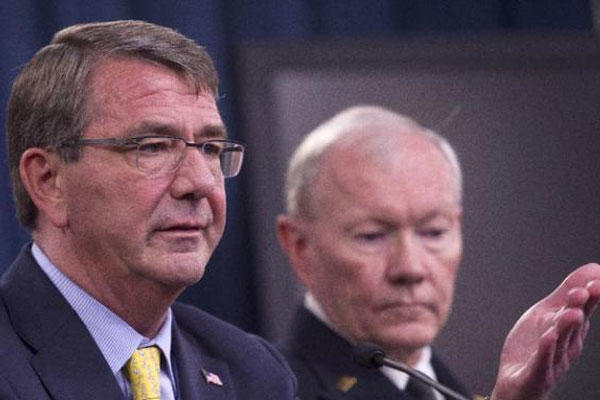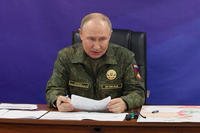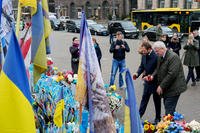The Defense Department joined the Department of Homeland Security and the FBI on Wednesday in warning of the threat of an ISIS attack in the U.S. over the 4th of July holiday weekend.
"Those who seek to harm this nation take no holiday," Defense Secretary Ashton Carter said at a Pentagon press briefing with Joint Chiefs Chairman Gen. Martin Dempsey.
Dempsey said U.S. bases nationwide were on higher alert, and Carter said that "some of our service members will be hard at work" over the weekend to deter the threat, without specifying what would be involved.
Last week, Homeland Security, the FBI and the National Counterterrorism Center began sending out bulletins to local law enforcement to step up security over the July 4th weekend.
The New York City Police Department said its "enhanced counterterrorism and security measures" will be greater over this weekend than in previous years. According to Rep. Peter King, R-N.Y., the NYPD has recently taken into custody five individuals suspected of ISIS ties.
The Islamic State of Iraq and Syria (ISIS), also known as ISIL and Daesh, has shown increasing ability to direct or influence terror attacks beyond its base in Iraq and Syria.
Last Friday, ISIS took responsibility for three separate terror attacks in Tunisia, Kuwait and France. ISIS was also believed to be responsible for attacks earlier this week on Egyptian army checkpoints in the Sinai peninsula.
In Tunisia, a beachfront attack killed at least 38; in Kuwait City, a blast at a Shia mosque killed 27; in the southeastern French city of Lyon, an alleged ISIS sympathizer attacked a gas plant and decapitated his former employer.
No plans to return Gitmo base
On other issues at the Pentagon news conference, Carter said that the announcement Wednesday that the U.S. would be opening an embassy in Havana and establishing full diplomatic relations with Cuba would not affect the status of the U.S. Naval Base at Guantanamo Bay and the detention facility for terror suspects.
Carter said he had "no anticipation and no plan" to return Guantanamo to Cuba.
Carter and Dempsey spoke two days after ISIS marked the one-year anniversary since its fighters in pickup trucks rolled into Iraq against little resistance from the fleeing Iraqi Security Forces (ISF), exposing the Sunni-Shia rift that has stymied efforts by the central government in Baghdad to reclaim ground.
Related Video
ISIS Propaganda Machine
In a June 29 release on social media, ISIS spokesman Abu Mohammed al-Adnani said, "Listen to your caliph and obey him," a reference to ISIS leader and former U.S. detainee Abu Bakr al-Baghdadi, who now calls himself the "Caliph" of the Islamic State.
Time Magazine quoted retired Marine Gen. James Mattis as saying that "They've been able to hold ground for a year. The longer they hold territory, it becomes this radioactive thing, just spewing out this stuff as fighters go there and then come home again."
Carter and Dempsey said that the campaign of the U.S. and its coalition partners to "degrade and defeat" ISIS is hampered by the slow pace of training Iraqis at five sites in Iraq and "moderate" Syrian rebels at sites outside Syria to combat ISIS.
Fewer than 100 Syrian rebels reportedly are currently in the training program under Army Maj. Gen. Michael Nagata of U.S. Central Command that was intended to have 3,000 in the field by the end of this year.
"We want to accept more" into the Syrian training program, Carter said, but the standards required of the trainees has slowed the process. "Only a fraction" pass the vetting to prove that they are moderates, Carter said, and others have refused to commit to fighting ISIS first, rather than the regime of Syrian President Bashar al-Assad.
Despite the problems, "We certainly won't take any shortcuts on vetting," Dempsey said. He speculated that recruiting and vetting might speed up at the conclusion of the Muslim holy month of Ramadan.
Carter said that about 8,500 recruits in the U.S. six-week training program in Iraq and another 2,000 have separately been trained in counter-terrorism to police areas once they are liberated by the ISF. Both numbers are far short of initial U.S. projections.
Pentagon officials and U.S. Central Command have repeatedly said that ISIS was on the defensive overall and cited recent gains by a mixed force of Kurds, Syrian rebels and Arab Christians in Syria. The officials have also warned that the campaign against ISIS will take years.
To bolster the Baghdad government, the U.S. has boosted arms shipments, including AT-4 shoulder-fired rocket launchers to counter the vehicle-borne improvised explosive devices that ISIS has used to devastating effect in breaking ISF lines.
The Kurdish forces, which have been successful in gaining ground against ISIS in northern Iraq, have complained that they are being shortchanged on the U.S. arms shipments that are funneled through Baghdad.
Last week, an amendment sponsored by Sens. Joni Ernst, R-Iowa, and Barbara Boxer, D-Calif., to arm the Kurds directly failed in Congress.
-- Richard Sisk can be reached at Richard.Sisk@military.com.































